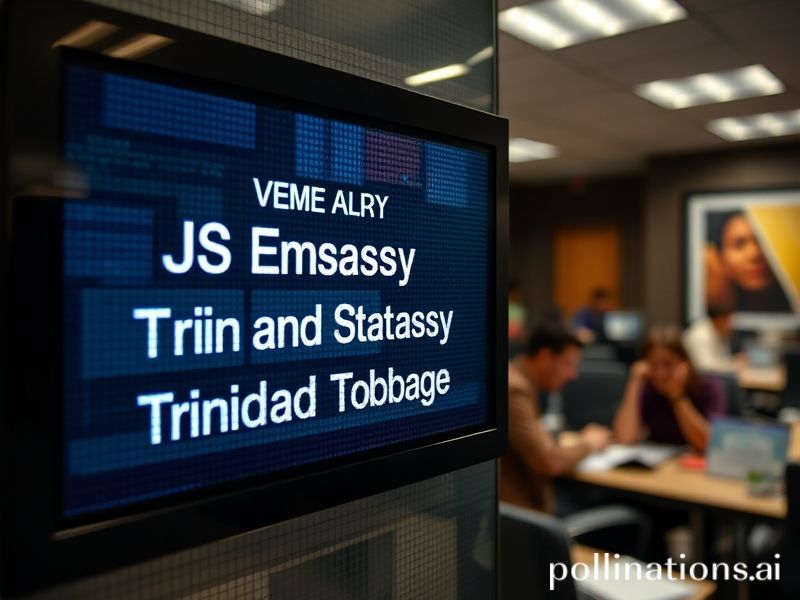Trinidad and Tobago US Embassy Alert: Why the Caribbean Is Trending for All the Wrong Reasons
# **Trinidad and Tobago US Embassy Alert: When the Caribbean Gets a Little Too Hot**
In the vast ocean of internet trends, there’s always something bubbling up to the surface. This time, it’s not a viral dance or a meme about a certain cartoon frog, but something a bit more serious: the **Trinidad and Tobago US Embassy Alert**. Yes, you read that right. The Caribbean is making headlines, and it’s not just because of its stunning beaches or Carnival. So, why is this alert trending globally, and what does it mean for the rest of us glued to our screens?
## **The Alert That Broke the Internet (Sort Of)**
On [insert date], the US Embassy in Trinidad and Tobago issued a security alert warning American citizens about potential unrest and violence in the country. The alert cited concerns over gang-related activities and political tensions. Now, while this might sound like your typical diplomatic heads-up, the internet had other plans. Suddenly, Trinidad and Tobago was trending on Twitter, Reddit, and even TikTok, with people speculating, joking, and—of course—meming the situation.
But why did this particular alert capture global attention? Well, for starters, the Caribbean is often seen as a paradise—sun, sand, and steelpan music. The idea that there could be unrest in such a picturesque place is jarring, to say the least. Plus, the internet loves a good “unexpected drama” narrative, and this alert delivered just that.
## **Cultural Context: Beyond the Postcard Perfection**
Trinidad and Tobago is known for its vibrant culture, from its Carnival celebrations to its diverse musical influences. But like any country, it has its share of social and political challenges. The US Embassy alert highlighted issues like gang violence and political instability, which are real concerns for locals and expats alike.
The alert also sparked conversations about how we perceive certain regions. The Caribbean is often romanticized as a tourist destination, but the reality is far more complex. This alert forced people to confront the idea that even in paradise, there are underlying tensions that don’t make it into the travel brochures.
## **Social Impact: Memes, Misinformation, and Misunderstandings**
As with any trending topic, the internet wasted no time turning the US Embassy alert into memes. From jokes about “running away from Carnival” to memes about “Trinidad and Tobago being the new hotspot for drama,” the internet did what it does best—turned a serious issue into a punchline.
But beneath the humor, there was also a lot of misinformation. Some people assumed the alert meant the country was on the brink of collapse, while others dismissed it as mere “American paranoia.” The truth, as always, lies somewhere in the middle. The alert was a precautionary measure, not a declaration of war, but the internet’s reaction showed how quickly information (and misinformation) can spread.
## **Why This Topic Matters**
So, why should you care about a US Embassy alert in Trinidad and Tobago? Well, for one, it’s a reminder that the world is interconnected. What happens in one corner of the globe can ripple out and affect global perceptions, travel plans, and even internet culture.
Secondly, it’s a lesson in media literacy. The internet moves fast, and not everything you read is accurate. The alert was a serious diplomatic communication, but the way it was interpreted and shared online showed how easily context can be lost in translation.
Lastly, it’s a reminder that every country, no matter how idyllic it may seem, has its own set of challenges. The Caribbean is no exception, and this alert was a wake-up call for many who had never considered the complexities of life beyond the resort walls.
## **Conclusion: When the Internet Meets Real-World Drama**
The Trinidad and Tobago US Embassy alert might not have been the most glamorous trending topic, but it certainly made waves. It showed us that even in the age of memes and viral dances, real-world issues can capture global attention. It also highlighted the importance of understanding the context behind the headlines and not getting swept up in the hype.
So, the next time you see a trending alert or warning, take a moment to dig deeper. You might just find that there’s more to the story than meets the eye—and maybe even a meme or two worth sharing.
—







